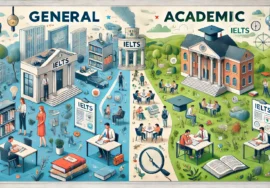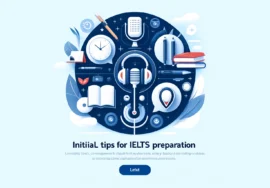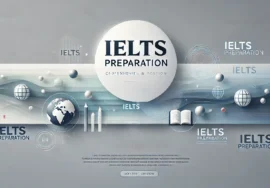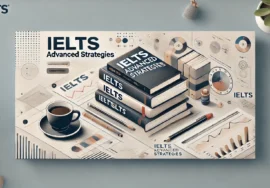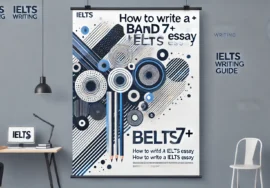
IELTS vs TOEFL: Choosing the Right English Test for Your Global Adventure
The world is brimming with opportunities for international students, from prestigious universities and exciting career paths to the chance to immerse yourself in a new culture. But to unlock these possibilities, you need to prove your English proficiency. That’s where IELTS and TOEFL come in – the two titans of English language testing. Both are your keys to global potential, accepted by thousands of institutions and organizations worldwide. But which one is right for you? This guide will help you navigate the IELTS vs TOEFL dilemma and confidently choose the test that best aligns with your individual needs and aspirations.

Test Format and Content: A Tale of Two Tests
While both IELTS and TOEFL assess your English skills, they do so in distinct ways. Understanding these differences is crucial in making an informed decision.
Overall Structure
- IELTS: Offers two versions – Academic (for university hopefuls) and General Training (for those seeking work experience or migration) – each with four sections: Listening, Reading, Writing, and Speaking.
- TOEFL: Has one version with the same four sections: Reading, Listening, Speaking, and Writing.
Section-by-Section Comparison

- Listening:
- IELTS: Throws you into the deep end with a variety of accents – British, American, Australian, and more! You’ll encounter diverse question types, from multiple-choice and matching to challenging tasks like map labeling.
- TOEFL: Primarily features North American accents and focuses on academic lectures. Expect mainly multiple-choice questions and summarizing tasks.
- Reading:
- IELTS: Presents a mix of academic articles and general interest texts. Question types include multiple-choice, True/False/Not Given, matching headings, and identifying specific information.
- TOEFL: Exclusively features academic texts. You’ll encounter multiple-choice questions, vocabulary in context, and sentence insertion tasks.
- Writing:
- IELTS: Two tasks: Task 1 (summarizing visual information like graphs or writing a letter, 150 words minimum) and Task 2 (essay writing, 250 words minimum).
- TOEFL: Two tasks: Integrated writing (reading and listening to a lecture, then summarizing, 150-225 words) and independent writing (essay, 300 words minimum).
- Speaking:
- IELTS: Get ready for a real-time conversation with an examiner! This interactive section has three parts: introduction, individual long turn (where you’ll speak for 2 minutes on a topic), and a two-way discussion.
- TOEFL: You’ll record your responses to six tasks, including independent prompts (expressing your opinion) and integrated tasks (summarizing information from a reading passage and a lecture). These recordings are evaluated later.
Scoring Systems: Cracking the Code
Each test has a unique scoring system.
- IELTS: Uses a band score system from 0 to 9 for each section and an overall band score. A score of 7 is generally considered good, while 8 or 9 demonstrates excellent English proficiency.
- TOEFL: Employs a scaled score ranging from 0 to 120, with individual section scores contributing to the total. A score of 100 or above is generally considered a good score.
Score requirements vary depending on the university or immigration program. For instance, a top-tier university might require an IELTS band score of 7.5 or a TOEFL score of 110.
Here’s a quick comparison table:
| IELTS Band Score | TOEFL Scaled Score |
| 9 | 120 |
| 8 | 110-119 |
| 7 | 100-109 |
| 6 | 80-99 |
| 5 | 60-79 |
Factors to Consider: Finding Your Perfect Match
Choosing the right test isn’t just about the format and scoring. Consider these factors too:
- Test Availability and Location: Check which test is offered more frequently and conveniently in your region.
- Personal Preferences:
- Test Format: Do you prefer the traditional pen-and-paper format of IELTS, or the computer-based TOEFL? Are you more comfortable in a live interview (IELTS) or recording your responses (TOEFL)?
- Accent Familiarity: If you’re more accustomed to North American English, TOEFL might be a better fit. If you’re comfortable with a variety of accents, IELTS could be advantageous.
- Test Content: Are you a visual learner who excels at summarizing charts and graphs (IELTS)? Or do you prefer integrating information from different sources (TOEFL)?
- Target Institutions: Most importantly, check the specific English language requirements of the universities or organizations you’re interested in. Some may have a preference for one test over the other.

Conclusion: Embark on Your Global Journey with Confidence
Choosing between IELTS and TOEFL can seem daunting, but by understanding the key differences and considering your individual needs, you can make the right decision. Whether you opt for the global accent variety of IELTS or the academic focus of TOEFL, remember that thorough preparation is key. So, research your options, practice diligently, and approach your chosen test with confidence. Your global adventure awaits!



